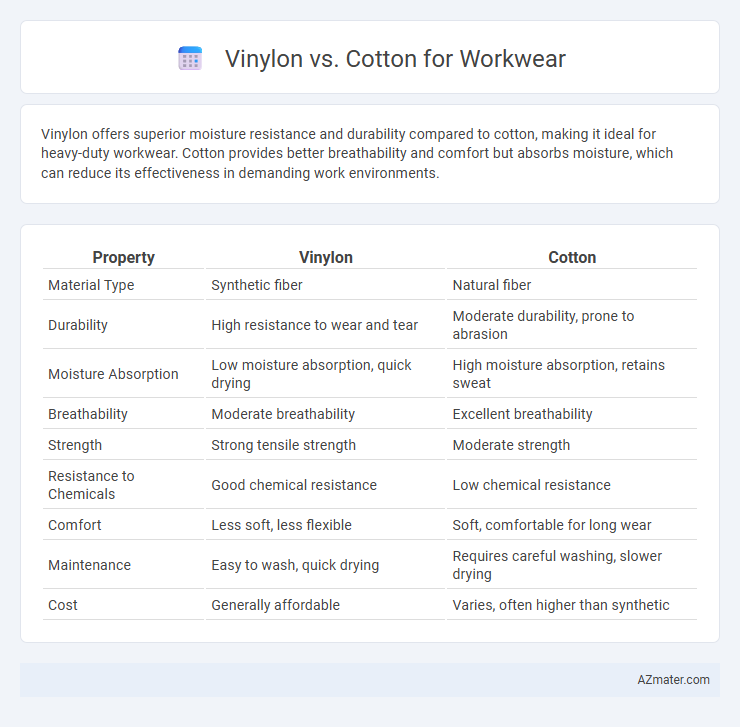Vinylon offers superior moisture resistance and durability compared to cotton, making it ideal for heavy-duty workwear. Cotton provides better breathability and comfort but absorbs moisture, which can reduce its effectiveness in demanding work environments.
Table of Comparison
| Property | Vinylon | Cotton |
|---|---|---|
| Material Type | Synthetic fiber | Natural fiber |
| Durability | High resistance to wear and tear | Moderate durability, prone to abrasion |
| Moisture Absorption | Low moisture absorption, quick drying | High moisture absorption, retains sweat |
| Breathability | Moderate breathability | Excellent breathability |
| Strength | Strong tensile strength | Moderate strength |
| Resistance to Chemicals | Good chemical resistance | Low chemical resistance |
| Comfort | Less soft, less flexible | Soft, comfortable for long wear |
| Maintenance | Easy to wash, quick drying | Requires careful washing, slower drying |
| Cost | Generally affordable | Varies, often higher than synthetic |
Introduction to Vinylon and Cotton in Workwear
Vinylon, a synthetic fiber known for its excellent resistance to chemicals, heat, and abrasion, offers durability and low moisture absorption, making it ideal for demanding workwear environments. Cotton, a natural fiber celebrated for its breathability, softness, and moisture-wicking properties, provides comfort and flexibility during extended wear. Comparing Vinylon and Cotton in workwear highlights a balance between resilience and comfort tailored to specific occupational needs.
Fiber Composition and Origin
Vinylon is a synthetic fiber made from polyvinyl alcohol, derived from petroleum products, offering high tensile strength and resistance to chemicals, making it ideal for durable workwear. Cotton, a natural cellulose fiber harvested from the cotton plant, provides breathability, moisture absorption, and softness, enhancing comfort in work environments. The contrast between vinylon's synthetic origin and cotton's natural source influences their performance characteristics, with vinylon excelling in durability and cotton preferred for comfort.
Durability and Strength Comparison
Vinylon fibers exhibit exceptional durability and superior strength compared to cotton, making them ideal for heavy-duty workwear. The synthetic composition of vinylon provides excellent resistance to abrasion, stretching, and tearing, outperforming the natural cellulose fibers in cotton. Cotton, while breathable and comfortable, lacks the tensile strength and long-lasting wear resistance necessary for demanding work environments.
Comfort and Breathability Factors
Vinylon fabric offers exceptional durability and resistance to chemicals, making it ideal for heavy-duty workwear, but it tends to lack the softness and breathability of cotton. Cotton excels in comfort due to its natural fiber structure, allowing superior moisture absorption and ventilation, which helps workers stay cool and dry during long shifts. For environments demanding high breathability and comfort, cotton remains the preferred choice, while vinylon suits settings requiring enhanced toughness and resistance.
Water and Chemical Resistance
Vinylon fibers exhibit superior water and chemical resistance compared to cotton, making them ideal for workwear in harsh industrial environments. While cotton absorbs moisture and chemicals readily, leading to longer drying times and faster fabric degradation, vinylon maintains its structural integrity and repels liquids effectively. This durability enhances worker safety and garment longevity in settings exposed to oils, acids, and other corrosive substances.
Maintenance and Care Requirements
Vinylon fibers offer exceptional resistance to chemicals and stains, requiring minimal washing frequency and enabling quick drying, which reduces maintenance time compared to cotton. Cotton workwear demands more frequent laundering due to its higher absorbency and susceptibility to dirt, often requiring specialized detergents to prevent fabric damage. The durability of vinylon ensures longer garment life with less fading and shrinkage, whereas cotton may need ironing and more careful handling to maintain its appearance and comfort.
Cost and Availability
Vinylon offers a cost-effective alternative to cotton for workwear, often priced lower due to its synthetic production process. Cotton remains widely available globally, benefiting from extensive agricultural supply chains, whereas vinylon availability depends on regional manufacturing facilities primarily in East Asia. For businesses prioritizing budget and consistent access, vinylon provides competitive pricing, but cotton's established market presence ensures easier procurement and greater variety.
Environmental Impact and Sustainability
Vinylon offers superior environmental benefits compared to cotton due to its synthetic production process, which uses less water and land resources, reducing overall environmental strain. Cotton cultivation requires significant amounts of water, pesticides, and fertilizers, contributing to soil degradation and water pollution, impacting sustainability negatively. Choosing vinylon for workwear significantly lowers carbon emissions and promotes durability, ultimately supporting eco-friendly and sustainable garment production.
Best Use Cases for Each Fabric
Vinylon excels in environments requiring chemical resistance and moisture-wicking properties, making it ideal for industrial workwear and outdoor labor. Cotton provides superior breathability and comfort, suited for jobs involving prolonged wear in hot or dry conditions such as construction or service industries. Combining durability and lightweight features, Vinylon is preferred for heavy-duty tasks, while cotton is favored for tasks prioritizing comfort and ease of movement.
Final Recommendation: Vinylon or Cotton for Workwear
Vinylon offers superior durability, moisture resistance, and chemical resistance compared to cotton, making it ideal for heavy-duty workwear in industrial or outdoor environments. Cotton excels in breathability, comfort, and natural fiber properties, preferred for lighter tasks or environments requiring softness against the skin. For workwear demanding longevity and protection, vinylon is recommended, while cotton suits roles emphasizing comfort and airflow.

Infographic: Vinylon vs Cotton for Workwear
 azmater.com
azmater.com